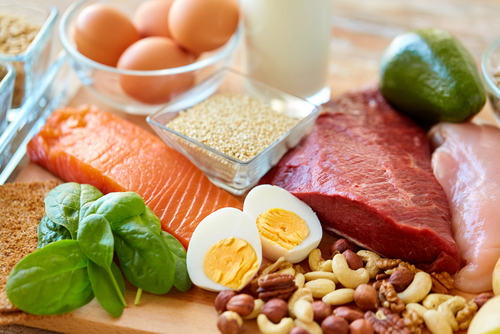Read the latest and greatest from our team
of incredible specialists.

Beach House Recovery Center » Blog » What to Eat to Encourage Sobriety
A healthy diet is important under any life circumstances, but in recovery from addiction, it provides special benefits:
Plus, healthy eating is a fairly easy first step toward a healthy lifestyle in other areas of life, and the healthier you are overall, the easier it is to appreciate the benefits of living without drugs.
Specifically what (and how) should you eat after detoxing, to keep your mind and body on an even keel?

“Carbs” are paradoxical: they range from very healthy foods (fresh produce, whole grains) to very empty calories (glazed doughnuts, soda pop). While some fad diets have tarred the whole family with an ugly brush, medical experts agree that such carbohydrates as whole grains, legumes, and fresh produce are good for everyone, and especially for anyone recovering from addiction. Complex, high-fiber carbs boost the brain’s serotonin levels, and serotonin improves the ability to relax and to get along with others, thus reducing stress and relapse temptations. If someone is underweight after detoxing, starchier carbohydrates (beans, potatoes, carrots, bananas) also help healthy weight gain.
Dairy products are a good source of both. If you have problems digesting dairy, other calcium-rich options include tofu and kale.
Protein (and everything else) is best cooked without heavy sauces and frying oils. Fish and poultry are good meat choices, although someone who needs to gain weight can eat more red meat. If there’s any chance addiction has damaged your liver, get professional advice in diet planning: there’s some evidence that excessive protein intake can put an unhealthy strain on weakened digestive organs. (Which is definitely not a reason to be afraid of protein overall.)
While the need to gain weight is no excuse for consuming excessive sugar or unhealthy oils, there are plenty of healthier fats that provide extra calories and nutrients. Good news: you can still cook your food in oil. Just opt for sunflower, olive, canola or even coconut oil.
Other healthy “fatty” foods include:
Both can lead to, if not actually new addictions, chronic craving that’s too close to dependence. Plus, an excess of coffee, tea, cola or candy often means chronic “jitters” and increased stress, which are potential saboteurs of sobriety resolve. And the large majority of caffeine- and sugar-based foods are mostly empty calories.
Consider also that you might not be ready for “normal” caffeine and sugar intake during the first few months after detox. Some people can get stressed from one cup of “decaf” when everyday life includes the sort of major adjustments required in recovery. If you don’t want to abstain from favorite treats altogether, get a nutritionist’s help in planning how much (and what brands) you can handle. You could also try switching your morning coffee for cocoa: while the latter has caffeine and sugar, it also has feel-good chemicals that counter the stress effect. Plus, especially if you dislike plain milk, cocoa is one way of getting extra dairy and protein.
Whatever you drink with your breakfast, don’t neglect good old fresh water as a regular drink throughout the day. Water hydrates to maximum effectiveness flush out toxins and is free of calories. Two quarts a day is the standard recommendation, though the ideal amount varies with body weight, outside humidity, activity levels and other foods consumed.
Get a doctor’s advice on what vitamin pills to take and how many. Gulping them down in bulk is at best stressful to a weakened body. At worst, it’s outright poisonous.
Even if you’re eating all the right things, your body won’t thank you if you consume a whole day’s worth of calories at one sitting and hardly eat anything else for the next 24 hours. Even the traditional breakfast-lunch-and-dinner approach often proves too much at a time and too long between meals. Standard advice to healthy people is now:
If these are useful principles for people in overall good health, they’re all the more important when your body (and perhaps especially your digestive system) is recovering from long-term chemical abuse. Eat small amounts at a time, and eat slowly. Take time to savor every bite: consider it practice toward savoring every day of a happy and sober future!
Whether you’re researching for yourself or a loved one, Beach House can help. We understand that this is a serious time in your life and that the treatment center you choose matters. We want you to feel comfortable and empowered to make the right decision for yourself, a friend, or a family member. This is why a counselor is waiting and available to answer your questions and help put your mind at ease regarding the next steps. Many of the staff at Beach House have walked in your shoes. If you feel you’re ready or want more information about how to help a loved one, we can help today. You can also learn why we are voted the #1 rehab for addiction treatment in Florida.
We accept most major insurance plans and can verify your benefits quickly and confidentially.
We’re committed to helping you access the care you need, our admissions counselors can guide you through your coverage options and available resources.





"*" indicates required fields